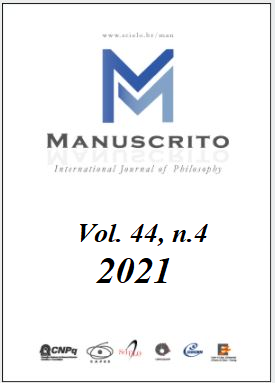Resumo
One of the few points of agreement between most theists and non-theists working on the problem of evil is that the existence of a perfect God is incompatible with the existence of pointless evil. In a series of influential papers, however, Peter van Inwagen has argued that careful attention to the reasoning behind this claim reveals fatal difficulties related to the Sorites Paradox. In this paper, I explain van Inwagen’s appeal to sorites reasoning, distinguish between two different arguments in his work, and argue that they both commit the same so-far-unnoticed mistake.
Referências
Adams, Marylyn McCord (1999). Horrendous Evils and the Goodness of God. Cornell University Press.
Alston, William (1996). “The Inductive Argument from Evil and the Human Cognitive Condition,” in Daniel Howard-Snyder (ed.), The Evidential Argument From Evil. Indiana University Press: 97-125.
Asgeirsson, Hrafn (2019). “The Sorites Paradox in Practical Philosophy,” in The Sorites Paradox. Cambridge University Press: 229-245.
Bergmann, Michael (2001). “Skeptical Theism and Rowe’s New Evidential Argument from Evil,” Nous 35: 278-96.
Cullison, Andrew (2011). “A Defence of the No-Minimum Response to the Problem of Evil,” Religious Studies 47 (1): 121-123.
Dragos, Chris (2013). “The No-Minimum Argument, Satisficing, and No-Best-World: A Reply to Jeff Jordan”. Religious Studies 49 (3): 421-429.
Endicott, Timothy (2000). Vagueness in Law. Oxford University Press.
Hick, John (1966/2010). Evil and the God of Love. Palgrave Macmillan.
Jordan, Jeff (2003). “Evil and van Inwagen,” Faith and Philosophy 20 (2): 236-239.
Jordan, Jeff (2011). “Is the no-minimum claim true? Reply to Cullison,” Religious Studies 47 (1): 125-127.
Jordan, Jeff (2014). “The No-Minimum Argument and Satisficing: a Reply to Chris Dragos,” Religious Studies 50 (3): 379-386.
Kamp, Hans (1981). “The Paradox of the Heap”, in Uwe Mönnich (ed.), Aspects of Philosophical Logic, Dordrecht. Reidel, 225-277.
Kraay, Klaas (2013). “Can God Satisfice?” American Philosophical Quarterly 50 (4): 399-410.
Kraay, Klaas (2014). “Peter van Inwagen on Gratuitous Evil,” Religious Studies 50 (2): 217-234.
Murphy, Mark (2017). God’s Own Ethics: Norms of Divine Agency and the Argument from Evil. Oxford University Press.
Oliveira, Luis R.G. (2020). “Skeptical Theism and the Paradox of Evil,” Australasian Journal of Philosophy 98 (2):319-333.
Perrine, Timothy and Wykstra, Stephen (2012). “The Foundations of Skeptical Theism,” Faith and Philosophy 29 (4): 375-399.
Plantinga, Alvin (1974). God, Freedom, and Evil. Harper and Row Publishers.
Rawls, John (1971). A Theory of Justice. Harvard University Press.
Raffman, Diana 2014, Unruly Words: A Study of Vague Language, Oxford: Oxford University Press.
Rowe, William (1979). “The Problem of Evil and Some Varieties of Atheism,” American Philosophical Quarterly 16(4): 335-341.
Rubio, Daniel (2019). “God Meets Satan’s Apple: The Paradox of Creation,” Philosophical Studies 175: 2987-3004.
Schrynemaker, Michael (2006). “Vagueness and Pointless Evil,” Proceedings of the American Catholic Philosophical Association 80 245-254.
Sorensen, Roy 2001, Vagueness and Contradiction, New York: Oxford University Press.
Sullivan, Meghan (2013). “Peter van Inwagen’s Defense,” in Blackwell Companion to the Problem of Evil. eds. Daniel Howard-Snyder and Justin McBrayer. Oxford: Wiley-Blackwell: pp. 396-410.
Tucker, Christopher (2016). “Satisficing and Motivated Submaximization (in the Philosophy of Religion),” Philosophy and Phenomenological Research 93 (1): 127-143.
Tucker, Christopher (2020). “Divine Satisficing and the Ethics of the Problem of Evil,” Faith and Philosophy 37 (1): 32-56.
van Inwagen, Peter (1988). “The Magnitude, Duration, and Distribution of Evil: A Theodicy,” Philosophical Topics 16: 161-187.
van Inwagen, Peter (1991). “The Problem of Evil, the Problem of Air, and the Problem of Silence,” Philosophical Perspectives 5: 135-165.
van Inwagen, Peter (2001). “The Argument from Particular Horrendous Evils,” Proceedings of the American Catholic Philosophical Association 74: 65-80.
van Inwagen, Peter (2006). The Problem of Evil. Oxford University Press.
Williamson, Timothy 1994, Vagueness, London: Routledge.
Wright, Crispin, 1975, “On the Coherence of Vague Predicates”, Synthese, 30(3-4): 325-365.
Wykstra, Stephen (1984). “The Humean Obstacle to Evidential Arguments from Suffering: On Avoiding the Evils of Appearance,” International Journal for Philosophy of Religion 16 (2): 73-93.

Este trabalho está licenciado sob uma licença Creative Commons Attribution 4.0 International License.
Copyright (c) 2021 Manuscrito: Revista Internacional de Filosofia


